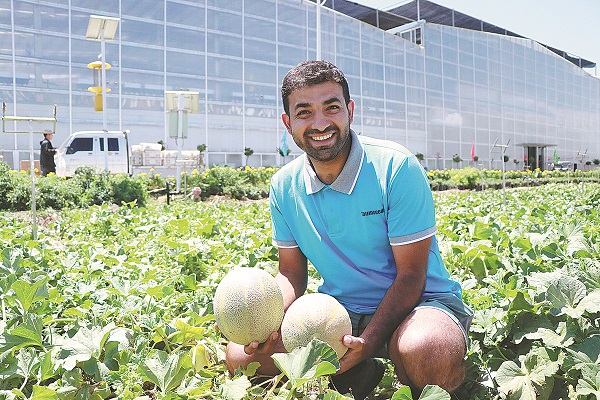Turk pursues dream planting seeds in Ningxia


YINCHUAN-Instead of escaping the summer heat in air-conditioning indoors, Mustafa Furkan Ozgener prefers the sunshine in an experimental seed field of over 200 kinds of melons in Pingluo county, Northwest China's Ningxia Hui autonomous region.
Picking melons, weighing them, observing their growth, tasting, recording and taking pictures, the 31-year-old Turkish man runs his tests on up to 50 kinds of melons every day.
"I love working in the field. Melons are favored in Turkiye in the hot summers and my job here is to choose the best kinds for Turkish customers," he said.
Influenced by his father who used to do business in China, Ozgener majored in Chinese at university and therefore expected a journey to China one day.
The chance came in 2011 when the young man visited China for the first time as an exchange student in Beijing. Two years later, Ozgener applied for a master's degree in tourism management at China's Sun Yat-sen University. Since then, he's traveled around the country to learn about colorful Chinese culture and enjoy different culinary dishes.
"The more I learn about China, the more I want to stay here," said Ozgener. With a good command of Chinese and English, he worked as a translator for the Middle East market for Ningxia Taijin Seeds Co after graduation.
As a major vegetable grower and consumer in the world with an annual sowing area of 20 million hectares, China's yield of vegetables in 2021 was about 800 million metric tons.
The company Ozgener works for is a scientific and technological enterprise engaged in vegetable breeding, production, promotion, import and export. It has bred over 70 new varieties of seeds and exported seeds to 27 countries and regions in Asia, Africa and the Middle East.
"Though many vegetables such as tomatoes and chilies are also quite common in the Middle East, the dietary habits differ. So the company breeds seeds that better cater for those foreign markets in colors, flavors and shapes," Ozgener said. "For example, Chinese like crisp melons, while Turkish prefer soft and creamy ones."
Before the outbreak of COVID-19, Ozgener would spend two months in China's southern island province of Hainan and another four months in Ningxia to help foreign clients select seeds.
Then he would go back to Turkiye to develop the international markets for the rest of the year.
But due to the epidemic, he has stayed in Ningxia for more than a year, observing, comparing and selecting target seeds in the field every day.
"I used to do translation work only, but now I'm also responsible for all the stuff related to the seeds. It's tiring but rewarding, and I can learn a lot about seed selection and breeding," said Ozgener.
He enjoys the slow-paced life in rural areas and also gets along well with local farmers. Some of the local residents often share their homemade food with him, "then I'll cut a melon as a gift in return", he said.
"I like my job in all respects. I will continue to pursue my dream here," said Ozgener. "China has abundant germplasm resources and the Middle East has a huge market. I can be a bridge in between."
XINHUA







